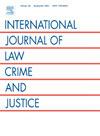Embodied overcrowding and sensory tensions: A carceral autoethnography of Philippine jails
IF 1.4
4区 社会学
Q3 CRIMINOLOGY & PENOLOGY
International Journal of Law Crime and Justice
Pub Date : 2025-09-02
DOI:10.1016/j.ijlcj.2025.100773
引用次数: 0
Abstract
In this paper, I undertake a sensorially oriented autoethnography of two Philippine jails, illuminating the visceral textures of carceral life that conventional sociological or criminological discourses often overlook. Drawing inspiration from Jewkes and Young's (2021) examination of Kyoto Prison, I foreground the overlapping realms of sight, sound, smell, and touch, arguing that incarceration is inherently a profoundly embodied phenomenon. By weaving personal reflections, field observations, and broader scholarly insights, I reveal how overcrowded dormitories, suffocating heat, and lingering bodily odours converge to redefine detainees' spatial, temporal, and psychosocial realities in ways rarely captured by quantitative metrics. While mindful of Nelken's (2009) caution against ethnocentrism and simplistic cross-cultural comparisons, I situate this Philippine context within a global conversation on punitive confinement, underscoring the urgent need for sensorially attuned research, policy, and praxis. Ultimately, this paper advocates for a radical reconsideration of punishment's sensory dimensions in the pursuit of more humane (if ever possible) penal landscapes.
具体化的过度拥挤和感官紧张:菲律宾监狱的囚犯自我民族志
在本文中,我对两所菲律宾监狱进行了以感官为导向的自我民族志,阐明了传统社会学或犯罪学话语经常忽视的监狱生活的内在纹理。从Jewkes和Young(2021)对京都监狱的考察中获得灵感,我突出了视觉、声音、嗅觉和触觉的重叠领域,认为监禁本质上是一种深刻的体现现象。通过个人反思、实地观察和更广泛的学术见解,我揭示了拥挤的宿舍、令人窒息的高温和挥之不去的身体气味是如何以定量指标难以捕捉的方式重新定义被拘留者的空间、时间和心理现实的。虽然注意到Nelken(2009)对种族中心主义和简单的跨文化比较的警告,但我将菲律宾的背景置于惩罚性监禁的全球对话中,强调了对感官协调研究,政策和实践的迫切需要。最后,本文主张从根本上重新考虑惩罚的感官维度,以追求更人性化的刑罚景观(如果可能的话)。
本文章由计算机程序翻译,如有差异,请以英文原文为准。
求助全文
约1分钟内获得全文
求助全文
来源期刊
CiteScore
2.70
自引率
0.00%
发文量
25
审稿时长
47 days
期刊介绍:
The International Journal of Law, Crime and Justice is an international and fully peer reviewed journal which welcomes high quality, theoretically informed papers on a wide range of fields linked to criminological research and analysis. It invites submissions relating to: Studies of crime and interpretations of forms and dimensions of criminality; Analyses of criminological debates and contested theoretical frameworks of criminological analysis; Research and analysis of criminal justice and penal policy and practices; Research and analysis of policing policies and policing forms and practices. We particularly welcome submissions relating to more recent and emerging areas of criminological enquiry including cyber-enabled crime, fraud-related crime, terrorism and hate crime.

 求助内容:
求助内容: 应助结果提醒方式:
应助结果提醒方式:


